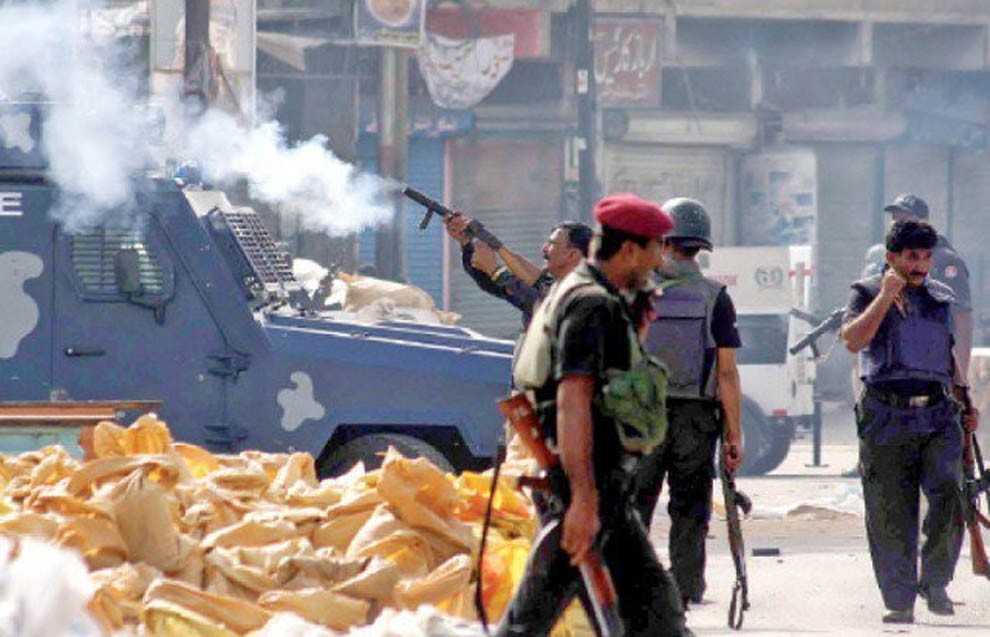
In a bid to restore peace to Lyari, the ‘most wanted’ gangster Ladla is eliminated with his two close associates in an encounter with Sindh Rangers

In Ali Muhammad Mohallah, Dubai Chowk area of Lyari, there is usual hustle bustle. It is hard to believe that a few days ago, in the early morning of February 2, the Sindh Rangers killed Noor Muhammad, alias Baba Ladla, the most dreaded gangster of Lyari, Two of Ladla’s close associates -- Sikandar alias Sikko and Mohammad Yaseen alias Mama -- were also killed in the encounter.
Residents of the nieghbourhood say that Rangers-led operation launched in September 2013 against warring gangs, otherwise operating with impunity, has changed the situation in Lyari. "In the case of killing of small-time gangsters, entire Lyari used to close down within minutes," says a grocery shop owner at Dubai Chowk, where Ladla was residing. "This time, no one in the nieghbourhood has closed down business on the killing of Ladla."
The Rangers in a press release claim that the ‘most wanted’ Ladla was involved in a number of subversive incidents and heinous crimes, including around 74 cases of murder, attacks on law enforcers, extortion, kidnapping for ransom, bomb blasts and drug peddling. The Sindh government had placed a head money of Rs3 million on Ladla in 2012.
Ladla, who was around 34 at the time of killing, earned notoriety as head of the armed wing of the proscribed People’s Aman Committee (PAC), a banned criminal gang led by Uzair Jan Baloch. Lyari’s community leaders who knew him well say that Ladla joined the gang led by Abdul Rehman, alias Rehman Dakait, in his early days and started selling drugs, extorting money from businessmen, and kidnapping and murdering people. By the end of 2008, he was promoted to the position of gang’s operational commander.
After the killing of Dakait in a police shootout in August 2009, Ladla believed he would succeed the deceased. But the gang’s control was handed over to Uzair Baloch, while Ladla remained the outfit’s commander.
"Baloch was the PAC’s political face. He did not commit any crime directly, except the gruesome killing of Arshad Pappu, the killer of his father," says a senior police officer, not wanting to be named. "It was Ladla, who was heading the militant wing of the criminal syndicate." He says all key commanders of the gang were under his command.
However, Laadla had parted ways with Baloch in September 2013 after the killing of Zafar Baloch, the PAC’s spokesperson, and made alliance with his rival gangs, led by Pappu and Ghaffar Zikri. Thus, a fierce infighting started in the streets of Lyari.
In the same period, a full-fledged operation against the gangs was started in Lyari and other Baloch-populated niegbourhoods of the city, where gangs had extended their influence. It forced both Baloch and Ladla to flee the city. The Rangers arrested Baloch in January last year in a mysterious way for his involvement in killing members of rival gangs and other heinous crimes. After his arrest, Ladla’s groups became powerful and controlled most of the areas of Lyari. There were reports about the arrest and killing of Ladla in encounters previously as well as on the Pak-Iran border.
Saqib Sagheer, a journalist extensively covering violent groups in the city, says that besides killing of Dakait and Ladla and arresting Baloch, law enforcement agencies have killed a number of key commanders and militants loyal to rival gangs of Lyari. "The crackdown has weakened the gangs badly and had had a positive effect on the security and socio-political situation of the old neighbourhood of the city," says Sagheer.
Lyari has a history of gang wars, clashes between drug pushers, and between criminal groups. The situation further deteriorated after the involvement of two key political parties -- the Pakistan People’s Party (PPP) and the Muttahida Qaumi Movement (MQM). Local activists in Lyari believe the PPP used Uzair Baloch and his gang for getting help in their own monetary issues and taking on the MQM.
Although most commanders have been killed in the ongoing crackdown, a few key ones including Zikri, Rauf Baloch, Wasiullah Lakho, Ustad Tajo, Ayaz Zehri, Shiraz Comrade and Mullah Nasir are reportedly still operating, according to police officials and local sources.
The commanders of these gangs are facing a severe financial crunch as the law-enforcement agencies have cut off their sources of revenue including extortion money, sources familiar with the gangs tell TNS. Also, unable to return to Lyari, their ability to extort money from traders and others has also been affected. But in recent months, the commanders have found a new way to operate -- they have formed smaller cells, recruiting young men with no past criminal records.
A political analyst who is researching on Lyari says the structure of these criminal networks appeared to be very ‘cell-oriented’.
"That’s why even when the ‘bosses’ have been eliminated from the game, the organisations continue to thrive," he adds. Meanwhile, the law-enforcement agencies have recently busted a number of such small groups.